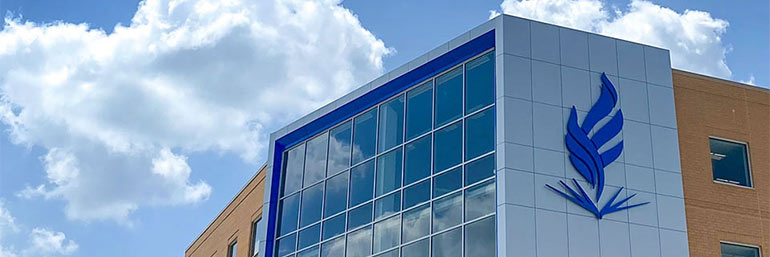Dec 15

Revitalized Ph.D. program in Basic and Translational Biomedicine is launched
The premier doctoral program in the College of Graduate Studies at Northeast Ohio Medical University has a new name Basic and Translational Biomedicine (BTB).
Previously called Integrated Pharmaceutical Medicine (IPM), the program’s co-directors Priya Raman, Ph.D., associate professor of integrative medical sciences, and Matthew A. Smith, Ph.D., assistant professor of pharmaceutical sciences, explain the rationale for the new name and revitalized curriculum as “a direct effort to adapt to an ever-evolving job market for STEM Ph.D. and M.S. graduates.”
Over the last couple of decades, the number of highly trained and motivated Ph.D.’s exiting STEM graduate programs (nationally) have outnumbered available traditional academic tenure-track positions by a substantial margin. Concurrently, there has been elevated demand for broadly trained Ph.D./M.S. scientists in industry (pharmaceutical, biotech companies and contract research organizations) with employment projections predicting a 10%-20% increase in industry opportunities over the next 10 years.
To adjust to this new demand, Drs. Raman and Smith aim, “to train independent critical thinkers and innovators who will be positioned to impact discovery and innovation in health care from multiple angles.”
The Basic and Translational Biomedicine program will continue to align and leverage the core strengths of NEOMED faculty researchers. Students will continue to learn to demystify disease mechanisms, identify disease targets and advance innovative therapeutic interventions and technologies by training with NEOMED’s nationally recognized faculty across the University’s research focus areas in Neurodegenerative Diseases; Heart and Blood Vessel Disease; Hearing; Musculoskeletal and Diabetes, Obesity and Metabolism.
A revised interprofessional curriculum will provide students with a solid foundation in research design, methods and data analysis. It will also allow them to explore other more industry-focused offerings in drug and device development and regulatory affairs. Students will be able to refine their research focus through new degree concentrations (Neuroscience, Cardiovascular, Musculoskeletal) that will provide further field-specific knowledge and skills.
Supplemental experiences and career development opportunities such as immersive extramural internship opportunities with industry partners are an added priority of the program. A partnership with preclinical drug investment and development firm Orange Grove Bio (OGB) has been established and other partners are soon to follow.
In addition to a revised curriculum, a third degree track has been created — M.S. in innovation. The M.S. in Innovation is a non-thesis bearing 10-month program designed for those more interested in medical device commercialization than drug development. Led by James Keszeinhemer, Ph.D., a professor of bioinnovation at NEOMED, the innovation track includes FDA regulatory education and training on commercialization of medical devices. Students engage in the design innovation process over a two-semester capstone course during which they observe clinical experiences, define unmet needs, ideate solutions, develop proof of concepts and conduct testing. Upon reframing the need and re-envisioning solutions, students develop more rigorous prototypes and present business plans around them at the NEOvations Bench-to-Bedside competition.
To help support the innovation work of NEOMED students and mentors, a Regionally Aligned Priorities in Delivering Skills (RAPIDS) grant in the amount of $179,209 was awarded by the state of Ohio and the Ohio Department of Higher Education. The grant aims to improve Ohio’s workforce development capacity, strengthen business and industry partnerships, and train Ohio’s workers for the jobs they will encounter in 21st century economy.
Julie Aultman, Ph.D., dean of the College of Graduate Studies at NEOMED, said the mission of the new program is “to educate and develop biomedical translational scientists who will be prepared to function in solution-based roles across academic, industry and regulatory agencies to impact evolving health care needs through discovery and innovation.”
Application information will be made available on the Basic and Translational Biomedicine website in January 2023.

